This review contains some spoilers, that we feel need to be discussed in order to best convey our opinions – you have been warned!
His Review by Ian Abbott
With an opening set of encounters rammed with religion, racism and fairgrounds, my initial impression of Bioshock Infinite was that here was a game daring to explore demanding themes, beautifully presented and typographically resplendent with a complex narrative for me to unfurl yet somehow it was lacking cohesion and failed to be a thing that is greater than the sum of its parts.
For me, character is king and narrative is queen; a tight marriage between the two ensures a satisfying gaming experience. As Ken Levine referenced in an earlier interview with SFL, Irrational Games took great care in building the plot and developing the relationship between the two main protagonists; Booker DeWitt and Elizabeth. However I found little reason to care for Mr De Witt or Lizzy as I was presented with a stiff and unforgiving pathway through the game which allowed for no deviation. With no personalised route or narrative freedom and very little skill needed to progress, the connection I hoped to build with the leading character just didn’t materialise; I wanted to invest in his plight and understand the motivation for the choices he (not me) made but the repetition of an unseen voice bellowing “Bring us the girl to wipe off the debt” did nothing to pique my interest in the story, this world or this man and girl.
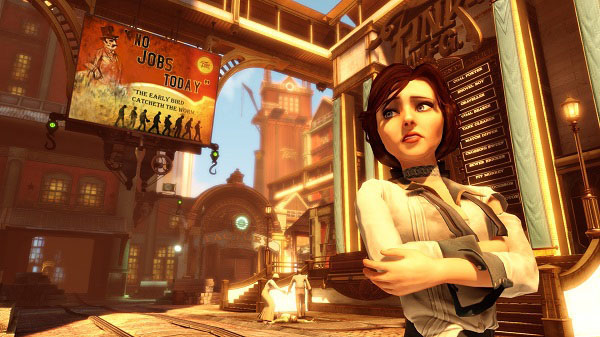
After rescuing Elizabeth from her steel tower, frustration abounded once more as it became clear there was no genuine need to guide and protect her through the alternating worlds of Columbia. She was bulletproof! She hid at the first sight of trouble, was the only character throughout the game without a life bar and came equipped with the unique, self-learnt skill of tearing a hole in time which allowed her and DeWitt to step into a myriad of alternative time spaces. Elizabeth could open tears that are dotted throughout the game, which were useful to manipulate during battle as they revealed extra weapons, health or cover. Bigger tears opened up possibilities for trans-dimensional travel to alternative realities that once entered offered no return. When I first encountered her in the tower, she had created a doorway in her room to 1983 Paris. Elsewhere, music derived from the Beach Boys and Cyndi Lauper would suggest other people have accessed tears; so we can go anywhere and anytime in the universe then Elizabeth? No, because that’s totally inconvenient for the plot but here’s a different Columbia where now everybody wants to shoot you. I wondered why, if she wanted to truly escape or avoid any peril, she didn’t step out of time whenever she wanted. Maybe she needed more practice? The result was that our joint and individual existences and actions lacked any consequence; the game would play the same with me or without me. I added no value to her life or experience, yet she chose to willingly follow within 30 seconds of meeting me. Lamb or sheep I wonder?
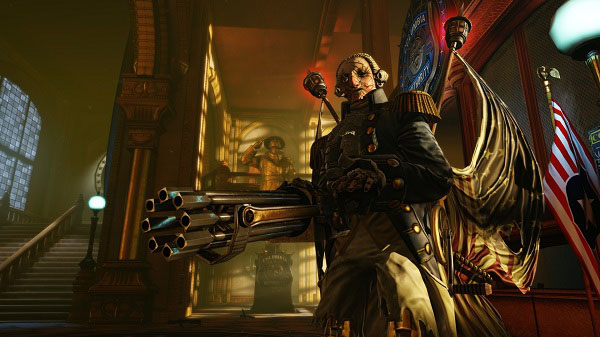
As a non-playable character, the mechanics of how Elizabeth interacts with Booker is however, very well crafted. Her lock picking, coin finding, salt tossing abilities complement the brutish Booker well. Enemies were easy to despatch and there was enough ammunition, food and salt to regenerate my abilities. Elizabeth sometimes stepped in with a giant hypodermic needle and brought Booker back from the brink of death, automatically reviving him and simultaneously removing any feeling of minor threat that I was going to be overwhelmed by a particularly tricky enemy. There is an unlockable 1999 mode where resources are greatly reduced but everything points to this being a game about narrative over mechanic so this didn’t appeal.
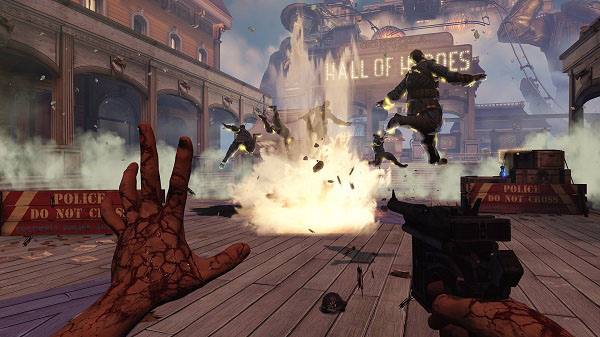
It wasn’t until the final hour of the 18 it took me to lead Booker and Elizabeth through the early twentieth century cloudlands of Columbia that a major flurry of plot revelations were belched out one after another, offering a Dynasty like ending and reasoning to the murky fog of a narrative in which I’d been existing. The religion and racism which promised so much and could have offered an exceptionally rich narrative field to plough and was trailed so heavily earlier in the game was replaced by a messy civil war with the science behind the time travel largely ignored.
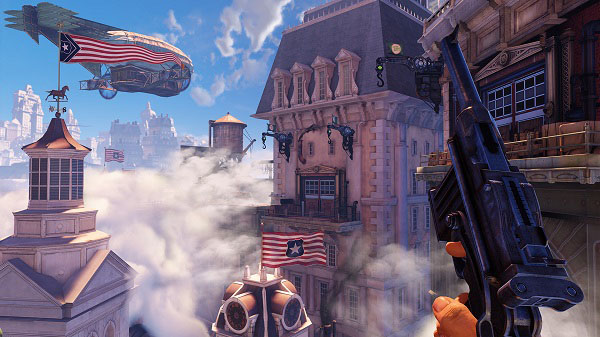
Irrational Games have visually and audibly doffed their caps to the Rapture of old; the audio design was wonderful as the crackling narrative is exposed through vox phones which are scattered around the nooks and crannies of Columbia whilst the framing of the environment through architectural lines and building flourishes was a sublime technical triumph. There was joy to be had quaffing different vigours (greatly improved in power and usability yet similar in effect from the plasmids in the original Bioshock), acquiring abilities like the bucking bronco which temporarily immobilised enemies in mid-air which I then electrocuted for a spectacular combo, creating a brief respite in the heat of battle. Even though the artistic craft was evident throughout, the glue needed to bind the game together and ensure a satisfying experience had been left out.
The game turned into a FPS set in a sonically enhanced, visual feast of a world but I didn’t care about the characters, I didn’t have fun playing it and the positioning of the plot revelations left me with bare threads to hang onto for the majority of the game. I will certainly not be worshipping at the infinite altar.
Her Review by Tracey McGarrigan
Similar to the exciting Easter sugar rush that’s followed by an inevitable crash afterwards, I’ve had a hard time digesting Bioshock Infinite.
Columbia took my breath away when I first entered the city in the clouds. Pretty brick facades, tidy communal gardens, and ornate hand painted shop signs hung under a bright sky, crisply and cleanly welcomed me. With attention to detail on every scale from the small brass bolts on the plates that shift and join sections of the city together to the idealistic beauty of marbled fountains and monumental statues, exploring Columbia as Booker DeWitt after an intensely dark arrival was a moment to savour. Intriguing, religious-flavoured conversation floating between the white faced folk of Columbia in their braces and bonnets about Father Comstock, the founding father and worshipped leader of the utopian City, and ‘the Sodom below’ lured me in but quickly spat me out as talk turned to the False Shepherd coming to lead the lamb astray. Posters emblazoned with flames and devil horns show the False Shepherd will be known by an ‘AD’ mark on his right hand. It was quite specific and quickly revealed that Booker was the branded man before things instantly got shooty and violent. Wondering why the hell this hardened ex-military man would carelessly reveal his hand when not two minutes before he had received a telegram advising him to keep a low profile, the sense of disempowerment that came when his anonymity was removed was a bitter blow. Columbia made it clear DeWitt was unwelcome but still he had a job to do – find the girl and get her back to New York for a mystery client who would wipe away all his debt.
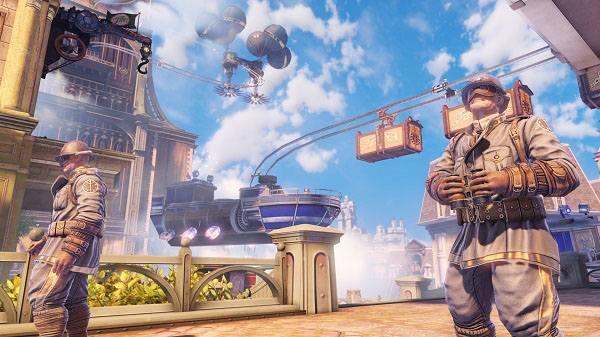
I found Elizabeth to be a jumble of frustrating contradictions. She has been subjected to harrowing and painful experiments since birth, yet unknown to her she has been observed and monitored by scientists whilst locked away in a tower under the watchful eye of The Songbird, a giant mechanical guardian. Considering the arrival of the False Shepherd had been ‘foreseen’, there was little resistance when infiltrating the tower – presumably all the scientists decided to nip out for a hot dog at the same time, relying on the menacingly swift and destructive Songbird to keep watch; the escape route was all too easy. Freed from her library of books and paintings, Elizabeth initially revelled in her new found freedom and wanted to explore. She is sometimes compliant but at other times completely ignores her rescuer. I never felt the supposed unique emotional bond. As Ian says, she was a handy sidekick, chucking vital ammo Booker’s way when his gun clicked dry but it raised the fuzzy question of who was really protecting who? Booker promises to help her escape Columbia so she can be truly free. Then a whole range of bafflingly coincidental, convenient, pre-determined and nonsensical events happened to ensure that Booker’s plan goes wrong; whilst trying to secure an airship for their escape, Booker and Liz boarded a perfectly working Zeppelin and purposely razed it to the ground. The flying Songbird was only alerted to Elizabeth’s whereabouts when she was indoors. Despite being given a voice (performed by Troy Baker who does a superb job with the material he’s given), a name and a background, Booker was actually the one being guided. I found him to be as anonymous in nature as the original Bioshock’s leading man on his pre-determined journey where I was a mere observer puppeteering him from A to B.
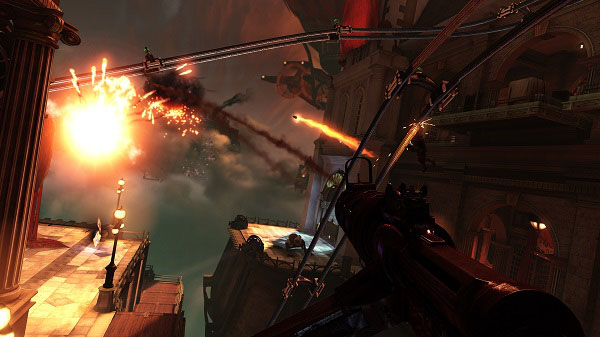
Booker did enjoy guzzling down vigors - powerful tonics that came in beautiful Art Nouveau bottles or purchased from eerie vending machines. Though occasionally tricky to make the most of in larger, more open enemy encounters, vigors can be easily switched and offered a slightly more varied and gruesome approach to combat, especially when mixed up combo style; using a watery tentacle to grab an enemy or possessing him so he electrocutes his comrades before he commits suicide certainly added drama. Though there were some enemy encounters that were staggering predictable (I wanted to explore a graveyard and finding it completely empty decided to continue on with the story which immediately sent me back to the same location though the dialogue suggested I’d never been there before and suddenly it was full of enemies), elsewhere there was surprisingly real joy to be had, particularly when riding the skylines – a suspended rail network used for transporting goods across the city – which were unquestionably the highlight of the game. Latching on at any point with his Skyhook, dangerously flipping directions in mid-air as the momentum forced Booker wildly around corners as he could quickly reposition himself whilst cold blue sky rolls underneath. Using any weapon on the rails made combat capricious and thrilling, especially when executing a brutally fatal blow on landing. Sadly there were too few opportunities to use the skylines which offered a stark contrast to the narrowly funnelled, often limited and monotonous ground battles with enemies that progressively didn’t get any harder, adding to my ever growing disinterest.
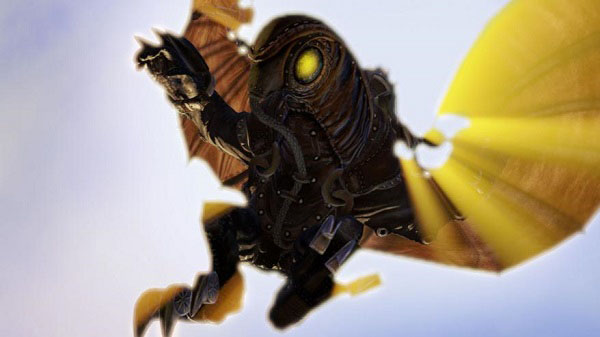
The science behind Columbia was mainly revealed in secret vox recordings whilst large chunks of backstory flickered in black and white kinetoscope film reels hidden throughout the game so no wonder Ian, who missed collecting a few, felt deeply unsatisfied. All the niggling questions and bewilderingly inconsistent loopholes are eventually (poorly) explained though may lead even seasoned sci-fi fans and quantum physicists to shake their heads. Here is where I think lies my greatest sadness and disappointment with Bioshock Infinite. The big reveal got tightly wound up and saved until the very end but it took one hell of a slog to get there by which time I had ceased to care about either Booker or Elizabeth. Where she would sometimes emotionally struggle with the consequences of her actions or her reactions to her environment, the disturbing horrors of a clinical facility, the destructive conflict of a civil war, the dramatic display of airship assaults had a much lesser impact on me as Booker who refused to take sides, completely denouncing his involvement in the events around him which I found hard to relate to. The most powerful relationship in the game actually exists between Elizabeth and her guard/carer The Songbird – the only living thing she had ever had contact with up until she met Booker and their story is genuinely moving. Perhaps if Columbia had laid its rotten secrets bare from the start rather than tirelessly suppressing them until the final scenes, Booker would have consciously fought to change his destiny and I would have helped him every step of the way rather than passively guiding him through with little motivation?
Fans of the series that do care will find they are greatly rewarded as Columbia is an astonishing artistic achievement and there are hidden easter egg treats scattered throughout. Though peppered with a few additional flavours, Bioshock Infinite sticks closely to Irrational Games’ original recipe which for me was filling yet sadly unsatisfying.
Bioshock Infinite is out now for X360, PS3 and PC.